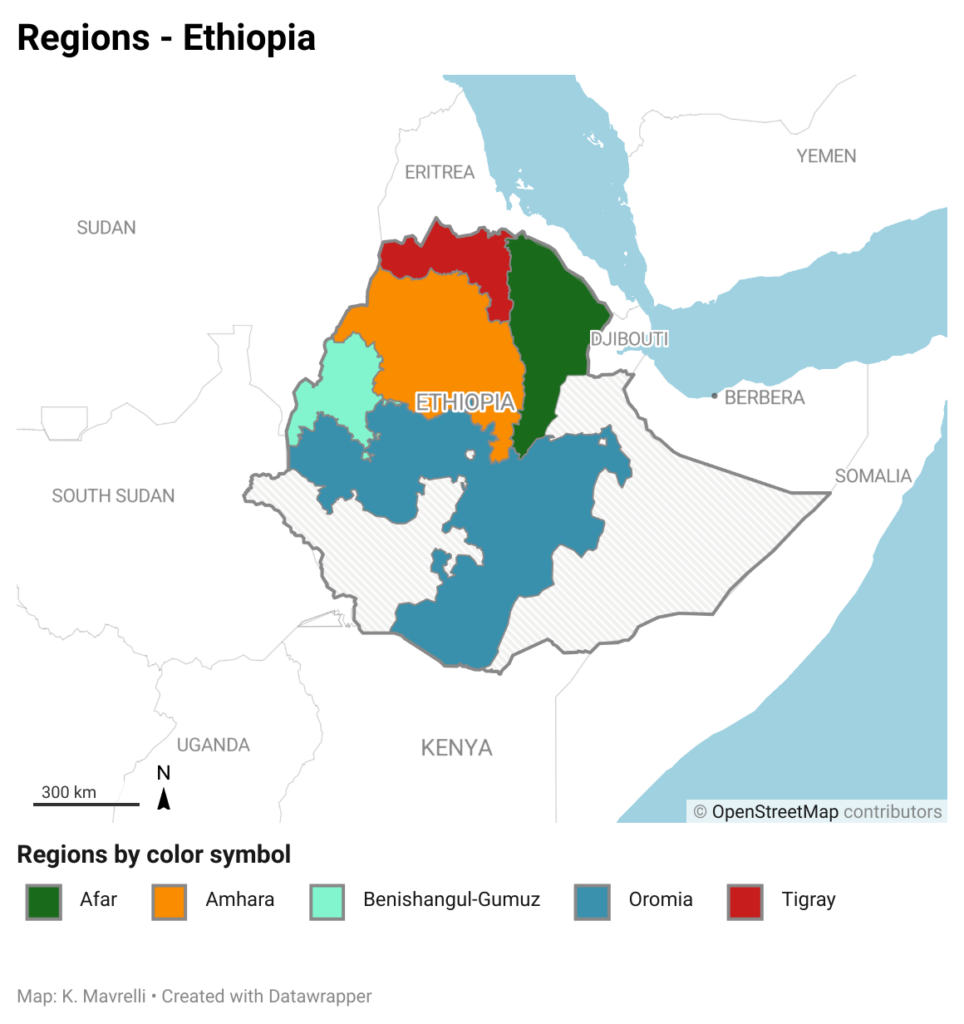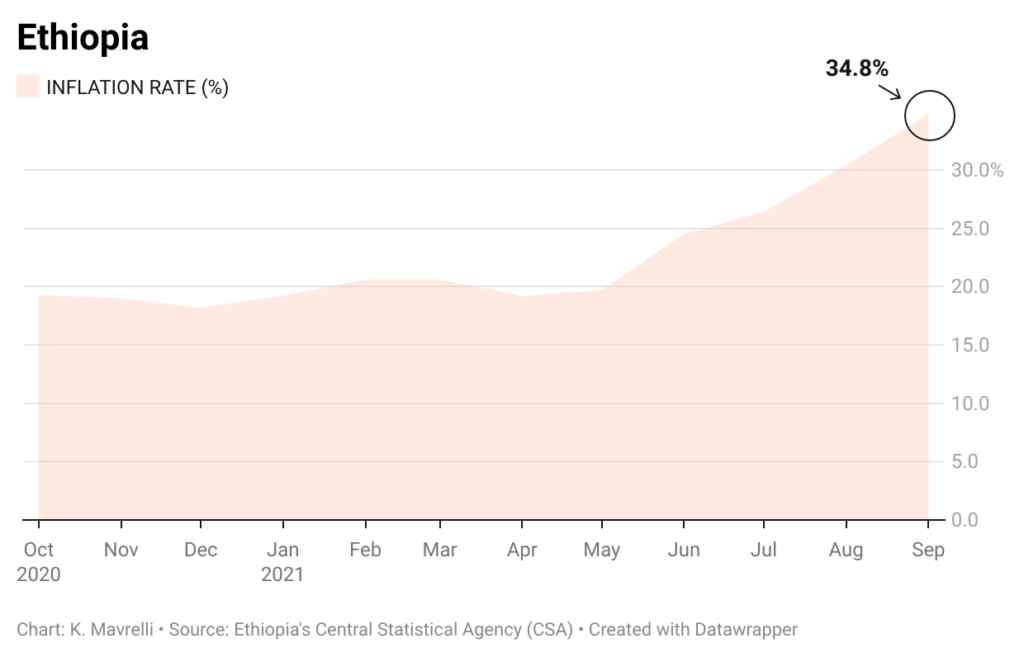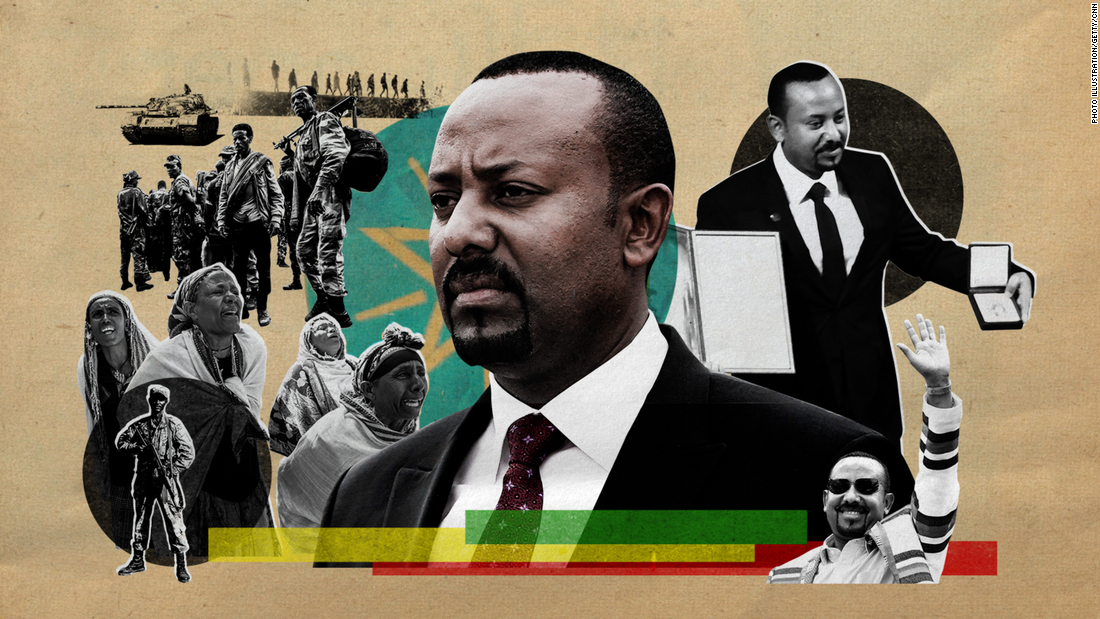By Katya Mavrelli,
After a truly turbulent year, Abiy Ahmed, Ethiopia’s 4th Prime Minister, was just sworn in for his second 5-year term. The inauguration was concealed from the attention of international media, and coverage of the event has been far from systematic. Yet, the significance of the results of the recent landslide election cannot be disregarded. After months of instability and turmoil, Ethiopia seems to be embarking on a path headed for regime security. But, is this the case? Or do the recent elections showcase deeper, more significant, political issues that underline the need for rapid regime transformation?
Addis Ababa, Ethiopia’s capital, was bathed in a sea of flags, flowers, and banners bearing the logo “new beginnings” ahead of the inauguration ceremony of Abiy Ahmed’s second term as Prime Minister. The Prosperity Party won a landslide election in June, marking this as the beginning of yet another 5-year term for Ahmed, who first came to power in 2018 after being appointed by Ethiopia’s ruling coalition amid widespread protests against his predecessor, Hailemariam Desalegn.
Ahmed’s last term has been defined by ups and lows. When the world was mesmerized by the U.S.A Presidential elections, Ahmed was awarded the Nobel Peace Prize in 2019 for implementing groundbreaking domestic reforms and for bringing an end to the long-standing stalemate with neighboring Eritrea. Serving as one of Africa’s youngest leaders, his vision and seemingly stable policies that revolved around transformation seemed to blow a rejuvenating air towards Ethiopia. This young, promising new leader sparked hope in Ethiopians, who saw him and Sahle-Work Zewde, Ethiopia’s 5th and current President and the first woman to hold the office, as the keys for long-lasting stability and much-desired change.
However, just when all eyes were turned to the U.S.A and its mesmerizing electoral debates, Ahmed ordered the initiation of a military offensive against Ethiopia’s northern Tigray region. Tigrayans and the Tigray People’s Liberation Front (TPLF) have ruled Ethiopia for decades, after the fall of the Mengistu Haile Mariam regime. Tensions between Ahmed and the TPLF culminated in September 2019, when the TPLF defied the central government and decided to hold parliamentary elections on their own as a result of Ahmed’s systematic efforts to sideline and marginalize the TPLF from the political scene.
Fast forward to today, Ahmed was sworn in for his second 5-year term after a landslide election victory for his party, promising a “new beginning” for Ethiopians. After his last years in office, this is exactly what the country needs. With inflation reaching a record — high of 34% and the national debt increasing to $30 billion, the efforts to privatize some of the country’s corporations, such as Ethio Telecom, haven’t been enough to help the country climb back to a position of prosperity in the list of African countries. The conflict in Tigray scarred Ethiopians —and their foreign investor— who lost faith in the government and accused Ahmed of mismanagement of the situation, and possible genocide.

What amplifies this skepticism is the very distinct ethnic background of the country. The term “diversity” would be an understatement to do justice to the true distinctiveness of each national region. Soon after the conflict broke out in Tigray, ethnic-based violence broke out in other regions as well, such as Oromia, Afar, Amhara, Benishangul-Gumuz, and the south. The cheering crowds that welcomed Ahmed in his second term in office seem to be part of the population that has sidelined the significance of these internal crises. And even though Ahmed’s original political ideology of medemer —an Amharic term referring to the act of coming together beyond ethnic identities— seems to have resonated well across Ethiopia, the actual act of overcoming ethnic differences and uniting has fallen short of its actual goal.
In this “new beginning”, Ahmed has pushed through a new parliament and has appointed new cabinet ministers at the ministry of finance, defense, and peace, all of which are members of opposition groups as a sign of inclusivity. However, this has been seen as a desperate move by many, who perceive this as “window dressing”, with which Ahmed has left some room for maneuvering for the opposition parties, but doesn’t fail to remind them of who is still in charge.
The current aura of political tension stems from the deeply entrenched system of ethnic federalism, which has been the main political system for decades. With key ethnic groups, notably representative from the regions of Tigray and Oromia, nowhere to be seen in ministries and departments, Ahmed can’t deny that his vision to become Ethiopia’s new unifier has fallen short of its promises. Even though his intention was to stimulate political dialogue, open up the political scene and create a new, more liberalized, platform for ideological expression, the implemented policies show that he is actually moving in the opposite direction. Without sincerely addressing the grievances and dissatisfaction that pushed the opposition parties to take up arms against Ahmed in the first place, how can he claim to pursue a new agenda, and initiate a new course in politics?
And while Ahmed tries to rise from the ashes of the previous term by trying to beautify the divided political scene, the U.S.A have decided to open a human rights abuse investigation. Due to reports of atrocities, and possible acts of genocide, in the region of Tigray, U.S.A President Joe Biden approved a series of broad sanctions in September against those involved in perpetrating such acts against Tigrayans. However, the end of the rainy season in Ethiopia marks a gloomier future for the ethnic communities, because fears for a new offensive have rung alarm bells across the country, and the concerns for the worsening of the standing of human rights are increasing.
Ethiopia’s current scene brings the J-curve of economics into mind. According to this theory, things will get worse —maybe significantly worse— before they get better. Just like this, Ethiopia will experience tougher times before prosperity and a sense of stability embrace the nation once more. Ahmed’s new agenda, filled with ambitious goals and policies, has the aim to bring back some of the much-needed economic stability, political coherence, and social unification that characterized Ethiopia at Haile Selassie’s time. The constraints that have been imposed upon Ahmed and his government by the international community also suggest that human rights violations and social unrest can be no longer permitted.
The desire for change has dictated this path towards “a new beginning”, which also suggests that Ahmed himself recognizes the need for change. As international relations theory teaches us, in order to hold on to power and secure the lifeline of their regime, politicians have often resorted to top-down reforms, aggressively implemented in a need to strengthen some of the remaining pieces of their political structures. Ahmed’s agenda and his plan for the next 5 years seem just like that, like a feeble attempt to reinstate some much-needed stability, no matter how forces this seems.

Not all hope is lost, however. Politics is the language of maneuverings and adaptation, information collection, and policy modification. Maybe Ahmed adopted the notable Draghi “whatever it takes” doctrine. Maybe he simply hasn’t evaluated the situation as he should. Or maybe he genuinely believes that small changes like these will, indeed, resemble a breath of fresh air in the country. What is certain, however, is that in a deeply ethnically diverse setting like Ethiopia, if we are to talk about reform, change and restructuring, any politician shouldn’t stop at policy proposals that focus only on the surface. If we are to implement deep, fundamental, and proper reforms for the betterment of society and the improvement of the economy, pragmatic leaders need to emerge, that will consider facts, but also sculpt their suggestions according to the ethnic setting they find themselves in.
Functional adaptation, as Darwin proved, is the key to survival.
References
- Ethiopia is losing friends and influence, economist, Available here
- Ethiopia: PM Abiy Ahmed sworn in for new 5-year term, dw, Available here
- Biden signs executive order authorizing new Ethiopia sanctions amid reports of atrocities, CNN, Available here




